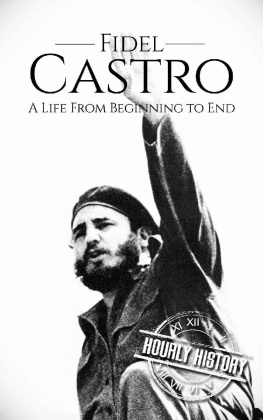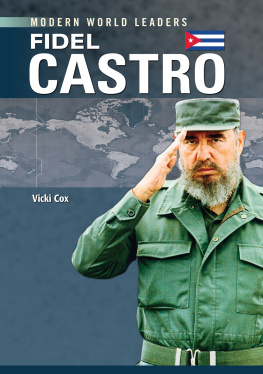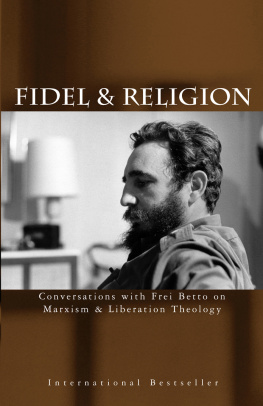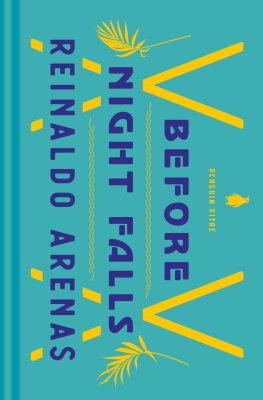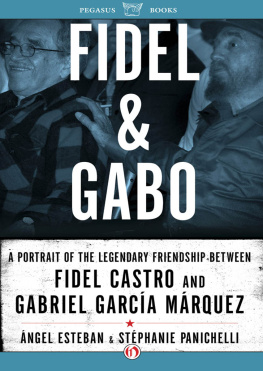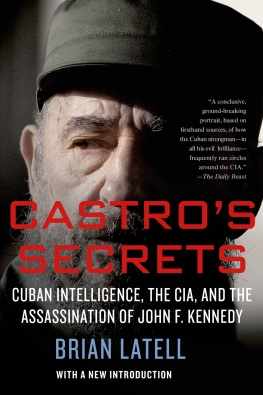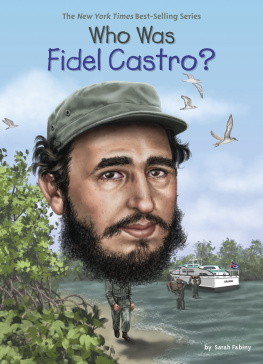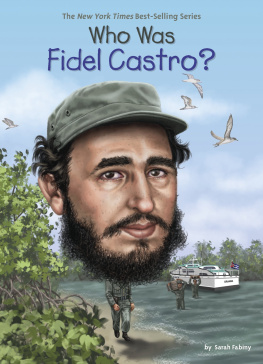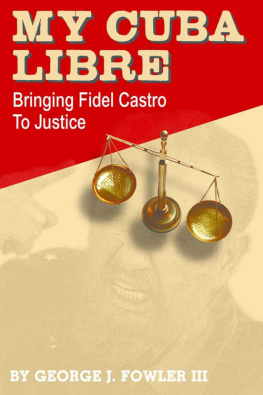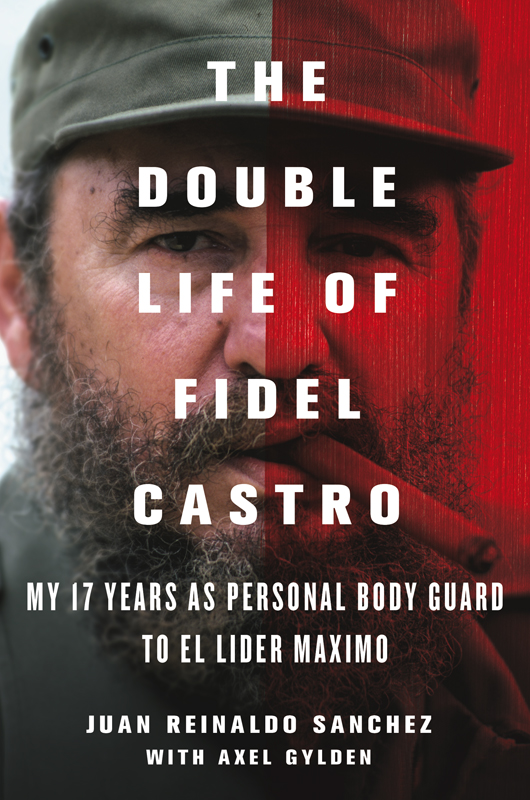Contents
Guide

The author and publisher have provided this e-book to you for your personal use only. You may not make this e-book publicly available in any way. Copyright infringement is against the law. If you believe the copy of this e-book you are reading infringes on the authors copyright, please notify the publisher at:
us.macmillanusa.com/piracy.
To my mother, the light of my life, shining example of humility and devotion. To my children Aliette and Ernesto. To their mother, who so often played the role of father in my absence. To my uncle Manuel, that dad who passed on extraordinary ethical values to me. To my grandparents ngela and Crespo, guardian angels whose presence I still feel. To my grandchildren and to my brother. And to all those who supported me in difficult times. May God bless you all.
Fidel Castros yacht was sailing in the Caribbean Sea, on the azure waters off the southern coast of Cuba. We had weighed anchor just ten minutes earlier, and already white dolphins had come to join us. A school of nine or ten of them were patrolling on the starboard side, right next to the hull, while another group streamed along in our wake, thirty yards or so behind the rear port side, looking for all the world like the motorized escort of a head of state on an official visit.
The reinforcements are hereyou can go and relax, I said to Gabriel Gallegos, pointing to the multitudes of dorsal swimmers cleaving through the water at high speed.
My colleague smiled at my quip. Three minutes later, however, the unpredictable creatures changed direction and moved off, disappearing into the horizon.
No sooner do they get here than they leave! What lack of professionalism, Gabriel joked in his turn.
Neither of us were strangers to professionalism. We had both joined the personal security team of the Commander thirteen years earlier, in 1977and in Cuba, nothing is more professional, more developed, or more important, than the protection of the head of state. Fidel had only to make the smallest excursion out to sea on a simple fishing or underwater hunting trip for an impressive apparatus of military defense to come into operation. And so Aquarama II Fidel Castros yachtwas unfailingly escorted by Pioniera I and Pioniera II , two powerful, virtually identical fifty-five-foot-long speedboats, one of which was kitted out with every form of medical care to deal with the slightest health problem that might arise.
The ten members of Fidels personal guard, the elite corps to which I belonged, were divided among these three vesselsjust as, on land, we were divided among three cars. The boats were all equipped with heavy machine guns and stocks of grenades, Kalashnikov AK-47 rifles, and ammunition to prepare us for any eventuality. Since the start of the Cuban Revolution, Fidel Castro had lived under the threat of attack: the CIA admitted it had planned hundreds of assassination attempts, involving poison or booby-trapped pens and cigars.
A bit farther out to sea, a lifeguard patroller was also deployed, providing maritime and air radar surveillance of the zone and with instructions to intercept any boat coming within at least three sea miles of Aquarama II . The Cuban air force was also involved: at the Santa Clara air base, sixty or so miles away, a fighter pilot in combat gear was kept on red alert, ready at any moment to jump into his Russian-made MiG-29 to take off in less than two minutes and reach Aquarama II at supersonic speed.
It was a sunny day. Nothing surprising about that: it was the middle of summer, 1990, the thirty-second year of the reign of Fidel Alejandro Castro Ruz, then sixty-three years old. The Berlin wall had come down the previous autumn; the American president George W. Bush was getting ready to launch Operation Desert Storm; and, for his part, Fidel Castro was sailing toward his private, top-secret island, Cayo Piedra, on board the only luxury yacht in the republic of Cuba.
Put into service in the early 1970s, Aquarama II was an elegant vessel with a ninety-foot white hull, a larger replica of Aquarama I , the racing yacht that had been confiscated from someone involved in the regime of Fulgencio Batistaoverturned on January 1, 1959, by the Cuban Revolution that had begun two and a half years earlier in the jungle of the Sierra Maestra by Fidel and sixty or so barbudos . In addition to the two double cabinsone of which, Fidels, was equipped with a private bathroomthe vessel could sleep twelve other people. The six armchairs in the main sitting room could be converted into beds, and there were two berths in the radio communication room and four more in the cabin reserved for the crew, at the bow. Like all self-respecting yachts, Aquarama II had all mod cons: air-conditioning, two bathrooms, a toilet, television, and a bar.
Compared with the playthings of contemporary Russian and Saudi Arabian nouveaux riches who cruise across the Caribbean or the Mediterranean, Aquarama II , however handsomely done up in its vintage style, would probably seem outdated. But in the 1970s, 1980s, and 1990s, this luxury yacht, entirely decorated in exotic wood imported from Angola, could hold its own against any of those moored in the marinas of the Bahamas or Saint-Tropez. Indeed, it was even clearly superior, because of its power. Its four engines, given to Fidel Castro by Soviet leader Leonid Brezhnev, were identical to those fitted on Soviet navy patrollers. At full throttle, they propelled Aquarama II at the phenomenal, unbeatable speed of forty-two knots, or about forty-eight miles an hour.
Hardly anyone in Cuba knew of the existence of this yacht, its principal mooring a private creek invisible and inaccessible to ordinary mortals on the eastern side of the famous Bay of Pigs, around ninety miles southeast of Havana. Since the 1960s, Fidels private marina had been hidden here, in the middle of a military zone and under close surveillance. The site, named La Caleta del Rosario, also housed one of his numerous vacation homes and, in an extension, a small personal museum devoted to Fidels fishing trophies.
It was a journey of forty-five minutes from this marina to Cayo Piedra, the paradise islanda trip I made hundreds of times. Each time I was struck by the vivid blue of the sky, the purity of the water, and the beauty of the marine depths. As often as not, dolphins would come to greet us, swimming at our side and then leaving again as their fancy took them.
We often used to play a game of seeing who could spot them first: as soon as somebody shouted Aqu est n! , there they were. Pelicans would often follow us from the Cuban coast as far as Cayo Piedra, and I loved watching their heavy, rather clumsy flight. For other members of this Cuban military elite, that crossing of three-quarters of an hour constituted a welcome break; protecting someone as demanding as Fidel required constant vigilance and afforded no opportunity for letup.
El Jefe (the chief), as we privately called him, generally stayed in the plush atmosphere of the main sitting room, usually in his large black CEO chair, in which no other human being had ever sat. A glass of his favorite drink of whisky on the rocks in one hand, he would immerse himself in the summarized reports from the intelligence services, go through the review of the international press prepared by his cabinet, or scour the telegrams from Agence France-Presse, Associated Press, and Reuters.
El Jefe would also take the opportunity to discuss current affairs with Jos Naranjo, the faithful aide-de-camp known as Pepn, who shared almost every moment of his bosss professional life until his death from cancer in 1995. Dalia was also there, of course. Mother of five of Fidels children, Dalia Soto del Valle was the woman who had secretly shared his life since 1961although Cubans did not learn of her existence until the 2000s. Finally there was Professor Eugenio Selman, Fidels personal doctor until 2010, whose professional competence and political conversation were highly valued by El Comandante . The primary function of this elegant, considerate, and universally respected man was obviously to look after the chiefs healthbut Fidels personal doctor also ministered to the whole of his entourage.


